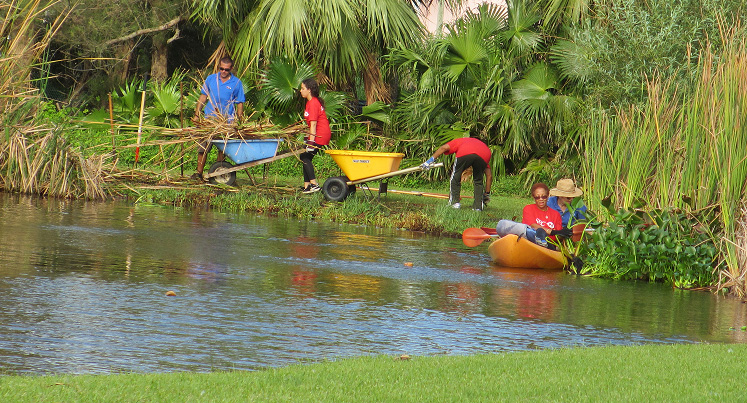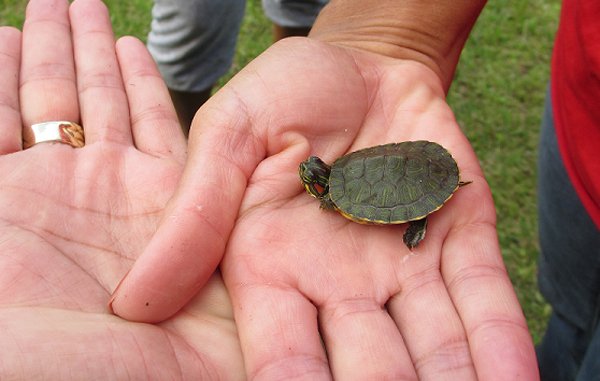Recent News
Seal Named “Northlands”, Set To Leave IslandMonday, March 20, 2023
The seal who was found on Clearwater Beach last month has officially been named Northlands — with Ruby Dill naming the seal after her granddaughter’s school — and Northlands will soon be traveling to the USA with the aim he continue his rehabilitation before being released back into the wild.
Plans Being Made To Send Seal To The USA
Saturday, March 18, 2023
The seal that was found in Bermuda last month — which is only a few weeks old — is “eating six pounds of fish a day, gaining weight, and generally doing well,” and plans are being made to send him to the Mystic Aquarium in Connecticut, with the same facility that accepted the seal that was found here in 2019, set to assist again.
BZS Trunk Island Cottage Receives Upgrade!
Friday, March 17, 2023
Thanks to the unwavering support of our donors, the Bermuda Zoological Society (BZS) has recently completed renovations to the cottage on Trunk Island – the BZS Living Classroom, the jewel in the crown of BZS education. The renovations have expanded the footprint of the current island classroom to encompass an expansion of the sheltered porches for outdoor learning while also providing storage areas for teaching tools.
Over 500 People Attend Lionfish Chowder Event
Friday, February 24, 2023
Chiko&T’s Restaurant won both the People’s Choice and Judge’s Awards at the BZS Lionfish Chowder competition, while The Cloud at the Waterfront, Wahoo’s Bistro, the Loren and the Spot Restaurant claimed second and third place honours.
HSBC Announced as Lead Sponsor of BZS Micro Forest Project
Monday, February 20, 2023
With the impacts of climate change being felt more and more each year, the need for reforestation projects has arguably never been more important and urgent. The Bermuda Zoological Society (BZS) today announced that HSBC has thrown its weight behind increasing Bermuda’s biodiversity, as Lead Sponsor of the BZS Micro Forest Project – Bermuda's Official Micro Forest Initiative.
About
GovernanceAbout Us
Newsletter
Latest News
Gift & Bookstore
Contact
General Inquiries
info@bzs.bm
Latest News
All the latest updates and news from the Bermuda Aquarium, Museum, and Zoo, one of Bermuda's leading visitor attractions!
The Bermuda Zoological Society’s [BZS] Wetlands Remediation Project [WRP], designated the HSBC Global Water Programme for Bermuda in 2014, said they had “great success in its efforts to make two ponds much less toxic for wildlife.”
“These findings are very encouraging since the toxicity of Bermuda’s ponds is a known threat to the island’s two endemic killifish species and its native diamondback terrapins, all locally protected species,” BSZ said.
“The HSBC Water Programme was a five-year, $100 million partnership with Earthwatch, Water Aid and the World Wildlife Fund established to provide a combination of water provision, protection and education, benefiting communities in need, enabling people to prosper, and driving economic development and growth. The Global HSBC Water Programme funded more than 59 water-related projects, with Bermuda being 1 in 35 participating countries.
HSBC Bermuda Volunteers assist the BZS with the remediation of the Cloverdale Pond

“The principal objective of the WRP was to determine if aerating Bermuda pond sediments enabled sediment bacteria to break down poisonous petroleum hydrocarbons to non-toxic levels. The sources of these hydrocarbons, which are found in most of Bermuda’s ponds, include used motor oil, road run-off and vehicle emissions.
“Previously, laboratory studies had shown that these petroleum hydrocarbons [particularly polyaromatic hydrocarbons or PAHs] were responsible for the limb deformities seen in the island’s toads and the severe endocrine disruption [i.e. altered hormone levels] and impaired reproduction observed in Bermuda’s pond fish, toads and terrapins.
“Laboratory studies had also demonstrated that bacteria in the sediments of sampled ponds were deprived of oxygen and therefore not able to efficiently degrade PAHs. However, simply adding oxygen to sediments from these ponds in the laboratory enabled the bacteria to effectively consume the PAHs. These promising results needed to be tested in the field and this effort was made possible by the generous two-year grant from HSBC Group.
“Two ponds were selected for the study, Cloverdale Pond and Evan’s Pond. Cloverdale Pond was the first pond chosen for remediation due to its small size, its known severe effects on wildlife, and the fact that it harboured no protected species in case the process of aeration produced any toxic by-products.
“Evan’s Pond was selected as the second test site due to its threatened small population of genetically unique killifish. The ponds were divided into sections and each section was aerated for 6 to 8 hours a day, using solar powered compressors sending air through weighted air lines to small-bubble distribution manifolds.
Volunteers appreciate the wildlife at Cloverdale Pond

Dr. Jamie Bacon, BZS Research Associate, Education Officer and Principal Investigator for the WRP, explained “It transpired that remediation on each section took approximately a year but by the end of that time, the levels of the 16 PAHs tested were reduced by 96-100% with 100% being a non-detectable level.
“Follow up laboratory studies using samples of remediated sediments from both ponds showed that they no longer caused endocrine disruption or impaired reproduction in fish. This was a fantastic result!”
Dr. Doug Fort, President of Fort Environmental Laboratories in Stillwater, Oklahoma and the project’s chief collaborator, added “The level of remediation accomplished far exceeded that which is typically achieved.
“The ability to reduce contamination to levels that do not adversely affect wildlife in the laboratory combined with presentation of a cleaner environment for humans and wildlife to interact with is a wonderful accomplishment.
“Without the support of HSBC Group, in concert with HSBC Bermuda, the Department of Environment and Natural Resources, the BZS, and the volunteers who participated in the effort, this would not have been possible.”
HSBC Bermuda CEO, Mark Watkinson said, “The Bermuda Zoological Society have demonstrated the importance of preserving our endemic wildlife as well as the adverse effects a compromised habitat can have on thriving eco-systems.
“HSBC is proud to have supported Dr. Bacon and Dr. Fort on this research to identify and reverse the causes of impaired reproduction and deformities on our endemic wildlife. The strength and biodiversity of our eco-systems is a good indicator of our own future health. Projects such as these, enables us to focus on the importance of environmental conservation – for the benefit of Bermuda’s future generations.”
The Bermuda Zoological Society have confirmed the next pond slated for remediation is the South Pond located on the Mid Ocean Golf Course.
They explained that this pond is a main feeding pond for the diamondback terrapins which” have a very poor hatching success rate due to pollution causing deformed embryos.”
The organisation is hoping for equal success rates with this initiative as has been achieved through the HSBC Water Programme remediation projects.


